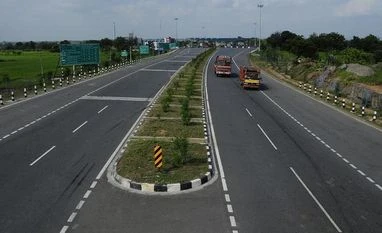As various sectors in the economy go through a sustained slowdown, the roads and highways sector remains a rare bright spot. Work has continued apace in a number of marquee projects of the Centre and the National Highways Authority of India (NHAI). This is evidenced in the pace of central funds as well.
The 2019-20 revised estimates of allocation to the Ministry of Road Transport and Highways (MoRTH) was the same as budgeted estimates, at Rs 83,015.97 crore. The capital expenditure component has been raised slightly, and revenue estimates have been cut by an equivalent amount.
However, the pace of spending has been ramped up substantially. During the first half of 2019-20, that is, till end-August, MoRTH had spent just 39 per cent of the full year target, compared to 50 per cent for the same period in 2018-19.
By end-January, that had gone up up to 87 per cent, compared with 72 per cent till end-January 2018-19. Most of this renewed focus has come in capital expenditure. Finance Minister Nirmala Sitharaman has made it clear that even in the face of lower revenue receipts, capital expenditure will not be compromised.
Till end-January 2019-20, capital expenditure by MoRTH was almost 90 per cent of the revised estimates, compared to just 69 per cent for the same period last year, while revenue expenditure was 71 per cent compared with 88 per cent. For 2020-21, MoRTH’s allocation has been budgeted at Rs 91,823.22 crore.
Meanwhile, MoRTH Minister Nitin Gadkari continues to talk about new projects and investments. At a recent event organised by another newspaper, Gadkari said that the government will shortly issue a tender for 3,000 kilometres of roads on build-operate-transfer (BOT) model.
“We are also planning to open 2,000 petrol pumps on national highways. The land will be from NHAI and petrol pumps from the oil companies," Gadkari had said.
Last month, the Minister also said that over Rs 1 trillion worth of work will be undertaken for tunnels over the next five years to ensure all weather connectivity in strategic parts of the country.
However, not all of it is smooth running. One of NHAI’s marquee projects, the Delhi-Meerut Expressway has run into some trouble. Phases II and IV of the project are slightly delayed due to construction ban in parts of the National Capital Region. However, officials are confident that the two phases will be completed well within the deadline of May 2020.
Meanwhile, work has been expedited on the Delhi-Amritsar-Katra expressway, though the the biggest challenge, of land acquisition, is yet to commence. Acquisition of land for the Rs 30,000 crore project, of which Rs 10,000 crore will be spent by NHAI on the 300km stretch in Punjab, will commence soon.
One of the most-anticipated projects, the Bangalore-Chennai Expressway has been delayed time and again, because environmental and other clearances were not forthcoming, various reports suggest. Work has not yet begun in spite of efforts by Tamil Nadu and Karnataka governments and NHAI. Additionally, part of the project, in Tamil Nadu, will require use of Navy land. These issues are yet to be sorted out.
The most prestigious projects among all of these, however, is the Delhi-Mumbai Expressway. The 1,320 kilometres project is expected to cost Rs 1.03 trillion, and Gadkari has promised that the Delhi-Jaipur stretch will be completed before Diwali. He has also invited prospective bidders to develop dedicated electric lanes with supporting infrastructure of EVs.
The entire project is expected to be completed in the next three years. Gadkari has said publicly that land acquisition for the project has been completed and has resulted in savings worth Rs 16,000 crore.
Unlock 30+ premium stories daily hand-picked by our editors, across devices on browser and app.
Pick your 5 favourite companies, get a daily email with all news updates on them.
Full access to our intuitive epaper - clip, save, share articles from any device; newspaper archives from 2006.
Preferential invites to Business Standard events.
Curated newsletters on markets, personal finance, policy & politics, start-ups, technology, and more.
)